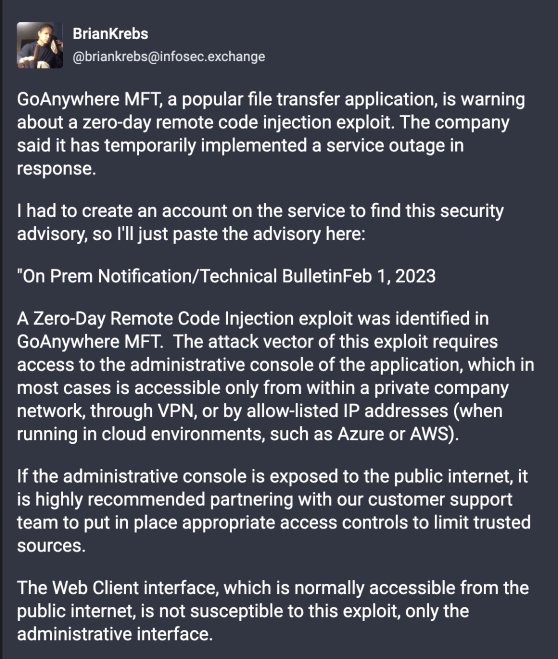Threat actors are actively exploiting a zero-day vulnerability affecting Fortra’s GoAnywhere MFT managed file transfer application.
Experts warn that threat actors are actively exploiting a zero-day vulnerability in Fortra’s GoAnywhere MFT managed file transfer application.
The popular investigator Brian Krebs first revealed details about the zero-day on Mastodon and pointed out that Fortra has yet to share a public advisory.
“GoAnywhere MFT, a popular file transfer application, is warning about a zero-day remote code injection exploit. The company said it has temporarily implemented a service outage in response.” Krebs wrote on Mastodon. “I had to create an account on the service to find this security advisory”
According to the private advisory published by Fortra, the zero-day is a remote code injection issue that impacts GoAnywhere MFT. The vulnerability can only be exploited by attackers with access to the administrative console of the application.
“A Zero-Day Remote Code Injection exploit was identified in GoAnywhere MFT. The attack vector of this exploit requires access to the administrative console of the application, which in most cases is accessible only from within a private company network, through VPN, or by allow-listed IP addresses (when running in cloud environments, such as Azure or AWS).” reads the advisory. “If the administrative console is exposed to the public internet, it is highly recommended partnering with our customer support team to put in place appropriate access controls to limit trusted sources. The Web Client interface, which is normally accessible from the public internet, is not susceptible to this exploit, only the administrative interface.”
Installs with administrative consoles and management interfaces that are not exposed on the internet are safe, however, security researcher Kevin Beaumont discovered about 1000 Internet-facing consoles.
Fortra recommends GoAnywhere MFT customers to review all administrative users and monitor for unrecognized usernames, especially those created by system.
“The logical deduction is that Fortra is likely seeing follow-on attacker behavior that includes the creation of new administrative or other users to take over or maintain persistence on vulnerable target systems.” reads a post published by Rapid7. “Note that, while this is not mentioned explicitly in the pasted Fortra advisory text, it is also possible that threat actors may be able to obtain administrative access by targeting reused, weak, or default credentials.”
Fortra has yet to address the flaw, meantime the company recommends removing the “License Response Servlet” configuration from the web.xml file as a temporary solution.
Follow me on Twitter: @securityaffairs and Facebook and Mastodon
(SecurityAffairs – hacking, GoAnywhere MFT)
The post GoAnywhere MFT zero-day flaw actively exploited appeared first on Security Affairs.


